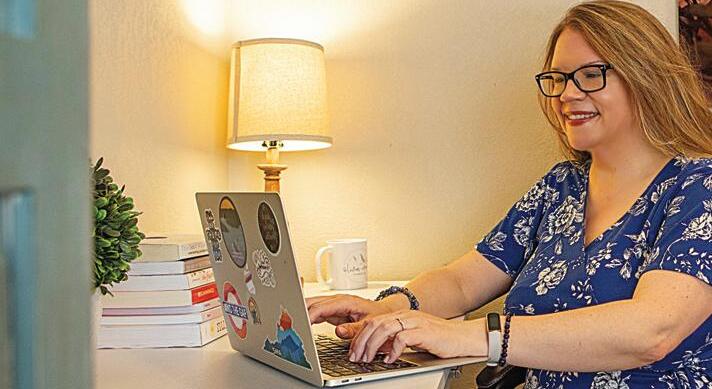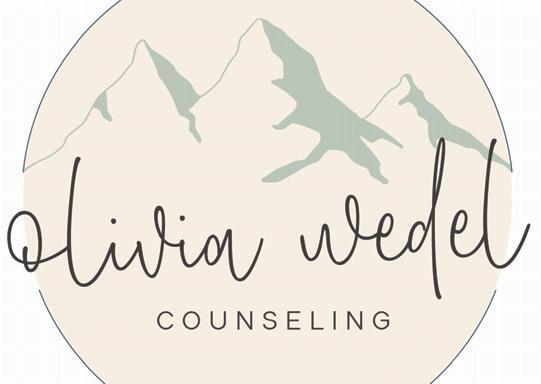
3 minute read
COUNSELING & CONSULTING
from August 2023
by societylife
The process of therapy is much like the metaphor of climbing a mountain—you will move at your own pace and reach the top (your goals) in your own way. Dr. Olivia Wedel will be part of this process as your guide. And then together, you work on solutions for improved clarity and renewal of your body, mind, and spirit. She’s helping women realize that they can feel better, think more clearly, and move forward with focus and intention. Even if you are so tired and frustrated you don’t know where to begin... there is hope!
Q: I think I might need therapy, but how do I know? Therapy is beneficial for everyone at various times in life. It is hard to give only one answer for how one might know they need therapy, because we all have different needs and things for which we hope. However, when thoughts and feelings lead to feeling stuck, overwhelmed, frustrated, and/or exhausted to the point your functioning is impacted, those are signs therapy might be helpful. I also want to promote the fact that something doesn’t necessarily have to be ‘wrong’ to seek therapy. Sometimes it’s simply helpful to have an objective, supportive person to share your thoughts and feelings. Verbal processing in the therapeutic context is very healing.
Q: What is a therapy session like? My approach is warm and collaborative. I believe clients are experts on their own lives, which is very solution-oriented, and if we can find ways to feel hopeful, then it can really assist with minimizing distress. When a client trusts me with their care, they invite me into their world, and I take that seriously. Therapy is a safe, non-judgmental space for conversations clients need to have, and one of the ways I guide this is by asking about their best hopes and what they most want to be different. Therapy can really help identify solutions and resources while building on sustainable change.
Q: How can therapy help me? Therapy helps you know you are not alone. It’s one more step in the right direction for ending the stigma of mental health. There is no shame in seeking help. Therapy helps individuals feel validated, hopeful, and empowered. I like to help clients identify resources, skills, and abilities in relation to improving distress tolerance. I also love sharing education on the brain and how it works to protect and support us—clients are amazed when they learn their brain can be ‘retrained’ or ‘rewired’ with new skills and tools for managing the emotions of daily life. I seek a lot of feedback from my clients on what’s working and when things are better—and if not, how can we do something different to achieve desired results.
mental health. I am a Licensed Professional Counselor and National Certified Counselor. I am trained and certified through Postpartum Support International in Perinatal Mental Health to provide specialized services for postpartum mood and anxiety disorders. I work primarily with postpartum depression, anxiety and rage. Screening and supporting mothers during postpartum time frame prevents prolonged distress and can save lives.
Q: How long will I need to be in therapy? This is different for everyone. I’ve had clients who felt they got what they needed in 4-6 sessions and others for several months. With respect to your time and planning ahead, the discharge process starts well in advance of the last session. I provide a unique care plan based on your needs and goals. It serves as a road map, so you know what I’ll be working on for our sessions.


Q: What are postpartum care planning sessions? Mental health must be included in your birth plan, but it’s normally left out. Then moms are caught off guard when they have symptoms after having a baby. Having a plan that supports sleep, nutrition, mental health, and household needs minimizes stress that may arise. Families aren’t left wondering what to do, or waiting on things to just get better. There’s no need to wait! I love helping families with postpartum plans
OLIVIA WEDEL COUNSELING & CONSULTING, PLLC




and may be done virtually or in person.
Q: Can I bring someone to therapy with me? Personal relationships are important and navigating them is essential if you think there’s a need. I don’t offer couples therapy, but I have many resources and referrals I can provide for couples and family therapists. Please do not hesitate to ask. Postpartum planning services are designed for couples and they are psychoeducational in nature.
Q: What if even you don’t understand my problems? Since my area of specialization is very specific in terms of women’s needs and various aspects of prenatal, perinatal, and maternal mental health, I am very careful in my screening process to ensure I am a good fit. When someone reaches out for therapy it’s imperative they feel like it is a good fit too, and we talk about this during the free consultations I provide in advance of scheduling. If I don’t understand your problems or they are outside of my area of expertise, I will provide referrals for other therapists who can help. It’s important to keep an open mind when going to therapy—it’s an investment of time, energy, and money, and sometimes things do not improve right away. However, that doesn’t mean it isn’t working. Change is definitely possible, and I strive to inspire that belief along with hope that things will get better!











